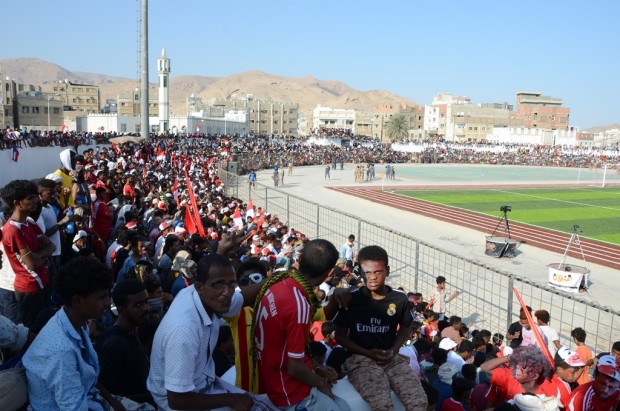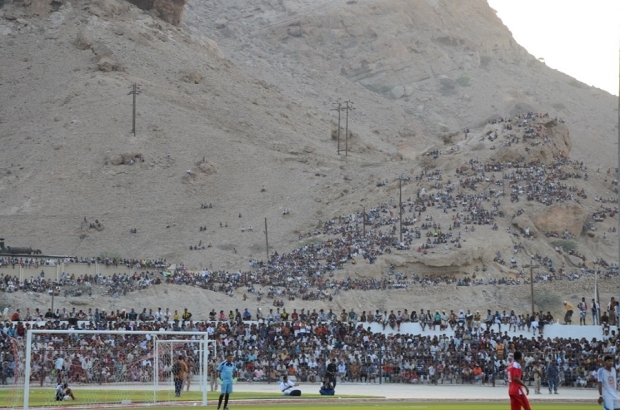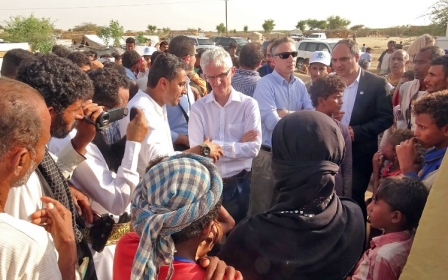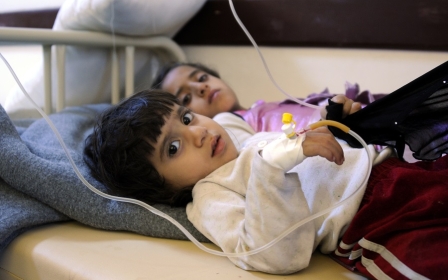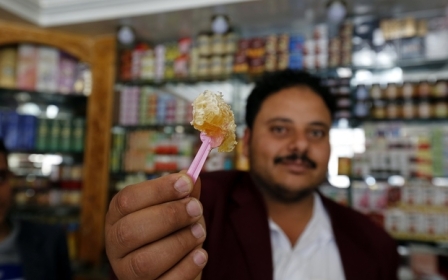Football brings joy amid war: Yemenis celebrate return of the game
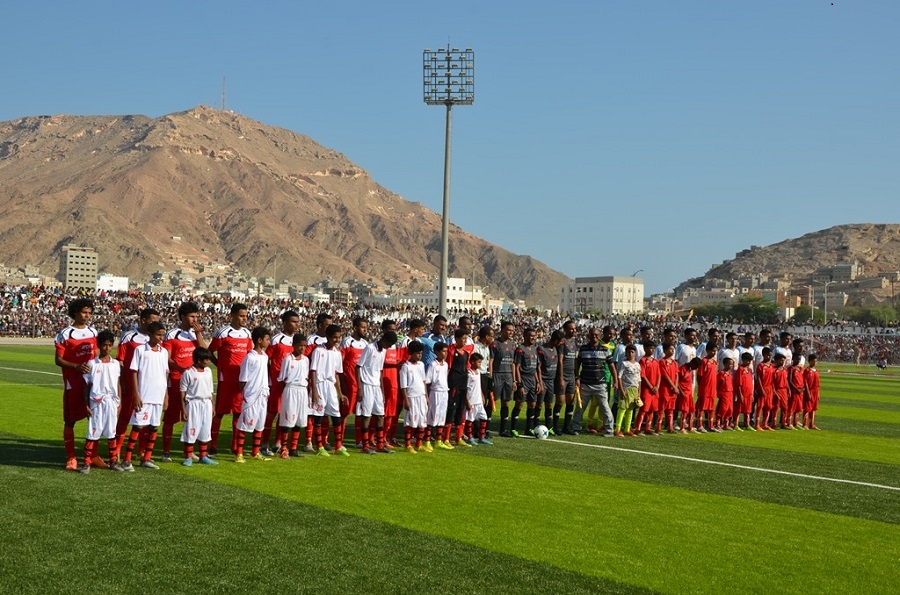
MUKALLA, Yemen - Fans from different corners of Hadramawt province flocked to Baradem stadium in the port city of Mukalla in southeastern Yemen last month to see the final match between Sha’ab Hadramawt and Salam al-Ghourfa, two teams in Hadramawt’s football league.
The event is held annually and brings together almost 40 local teams. The first match in the tournament was in August and the final was postponed until October, as Mukalla’s main stadium was under construction. The rest of the matches were held in smaller stadiums in Mukalla and the city of Ash-Shihr.
“This is a momentous day, the turnout is unprecedented,” Fadi Haqqan, a Sha’ab Hadramawt supporter, said cheerfully as both teams rolled onto the pitch.
The several thousand people were there to try to forget the woes of the civil war engulfing most of the nation.
Hadramawt wants to send a message of peace, coexistence and love
- Fahemi Ba Hamdan, sports commentator
The tournament was suspended in 2015 and 2016 after al-Qaeda's Yemen branch took control of the coastal city in April 2015, taking advantage of the ongoing war to expand its presence and power in the south.
In March 2015, the country slipped into a civil war between the Saudi-led coalition of Arab and Gulf countries in support of Yemen's toppled government and Shia Houthi rebels. It has left at least 10,000 civilians dead and three million displaced.
“Under al-Qaeda, sports activities were suspended, only small teams arranged matches,” Haqqan said, as swarms of fans with faces painted with their team's flag colours of red and white whirled around the stadium.
“We have been waiting for this moment for months," he added.
Al-Qaeda in the Arabian Peninsula (AQAP) turned some public places into military bases where militants were trained and sent to fight against Houthi rebels.
According to locals, AQAP disseminated its ideology and sought to extend its influence by repairing power stations, paving roads and importing fuel. Sports were not their top priority.
In April 2016, Mukalla - the capital of Hadramawt, Yemen’s largest province - was recaptured by Yemeni and Saudi-led coalition forces, backed by the US. After AQAP withdrew from the city, pro-government forces loyal to president Abd Rabbuh Mansour Hadi were deployed to secure it from the militants' attacks.
Local senior officials sitting in VIP seats at the match exploited the euphoric mood of the large gathering, bragging about their success in restoring peace to the former al-Qaeda stronghold. Afterwards, the governor of Hadramawt, Faraj Al Bahsani, told reporters that it was a “clear testament” to peace and stability.
The city is far from the main battlefield, but last year at least two attacks were claimed by the Islamic State (IS) group, leaving dozens dead.
Athletes become fighters
The football league was suspended in 2015, so many players abandoned their teams and joined the pro-government forces as fighters. Before the final match, soldiers from Sha’ab Hadramawt requested permission from their commanders to participate.
Many of the club players are from military units
- Saleh al-Naqeeb, head of Sha’ab Hadramawt club
“Many of the players are from military units. They were given time off [to compete],” said Saleh al-Naqeeb, the head of Sha’ab Hadramawt club.
After the tournament, the players went back to guarding the city and its checkpoints.
Since the beginning of the war, sports have suffered. Extensive shelling and aerial bombardments have damaged facilities in Sanaa and other cities, as athletes have either taken part in the fighting or fled the country.
Local authorities say they have no money as the war has damaged the economy of one of the poorest countries in the Arab world.
Baradem stadium, the main football stadium in Mukalla, was partly damaged due to a rare tropical cyclone that hit the province in November 2015.
Local authorities paid for the renovation, costing 151 million Yemeni riyals ($603,490), but the roads leading to the stadium are still filled with potholes and are overflowing with sewage.
'Getting nothing in return'
Residents agree that despite the fact that the tournament has uplifted people and revived hope for further sports events, they want more. They have demanded that the government dole out millions of dollars to rebuild damaged sites, build new stadiums, and fund similar tournaments.
Some residents have demanded that local authorities take a cut of oil revenues and spend it on rebuilding infrastructure.
Hadramawt produces as many as 40,000 barrels of crude oil per day and generates millions of dollars of revenues for the internationally recognised government, based in Aden.
“We sometimes meet in the open or hire a flat because we cannot afford to renovate the club’s building, burnt down under al-Qaeda. Hadramawt feeds the country’s treasury and get nothing in return,” Naqeeb said.
Hadramawt feeds the country’s treasury and get nothing in return
- Saleh al-Naqeeb, head of Sha’ab Hadramawt club
According to Naqeeb, the club's headquarters was burnt down during a brief battle between pro-government forces and AQAP, when they stormed the city in 2015.
But the government's reluctance to allocate funds for sports is understandable. The country is facing the world’s worst cholera outbreak, with close to one million cases expected by the end of the year, according to the World Health Organisation (WHO). Around a quarter of the country’s 28 million population are facing famine and thousands of public servants have not been paid since September of last year.
Last Monday, the Saudi-led coalition closed all air, land and sea ports in Yemen after Houthi rebels launched a ballistic missile at Riyadh on Saturday. Saudi Arabia denied clearance to UN aid shipments and flights carrying fuel, food and medicine. On Saturday, the transport minister announced that some flights would be allowed through as the blockade is eased but this has not been implemented yet, according to Yemen's national airline.
Sha’ab Hadramawt defeated Salam al-Ghourfa 2-1 and won the tournament, and it was followed by celebrations. Hundreds of fans took to the streets, dancing, honking horns and waving flags.
“People seek peace,” Haqqan said.
This article is available in French on Middle East Eye French edition.
New MEE newsletter: Jerusalem Dispatch
Sign up to get the latest insights and analysis on Israel-Palestine, alongside Turkey Unpacked and other MEE newsletters
Middle East Eye delivers independent and unrivalled coverage and analysis of the Middle East, North Africa and beyond. To learn more about republishing this content and the associated fees, please fill out this form. More about MEE can be found here.



